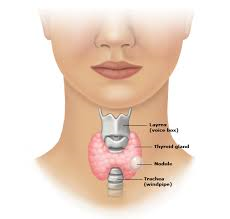Thyroid nodule
A thyroid nodule is a growth (lump) in the thyroid gland. The thyroid gland is located in the neck.
Thyroid nodules are very common and occur in up to 15 to 30% of the US population. Like most thyroid diseases, they are more common among women than men. The chance of having a thyroid nodule increases with age and by the time. By age 60 a woman has a 60% chance that she will develop a thyroid nodule. Although many thyroid nodules can be felt by the patient or by a doctor during physical examination, more and more nodules are being discovered incidentally during an imaging test like a carotid ultrasound, Neck mri scan or Neck CT scan ordered for another reason.
The most important questions to ask when a thyroid nodule is discovered are:
- Is the patient hyperthyroid (do they have too much thyroid hormone in their body)?
- Is this a cancer?
Fortunately, most thyroid nodules are benign (not cancer) and non-functional (not causing hyperthyroidism). Only 5 to 10% of thyroid nodules will end up being cancer.
Causes
Thyroid nodules are growths of cells in the thyroid gland. These growths can be:
- Not cancer (benign) or thyroid cancer
- Fluid-filled (cysts)
- One nodule or a group of small nodules
- Producing thyroid hormones (hot) or not making thyroid hormones (cold)
Thyroid nodules are more common in women than in men. A person’s chance of getting a thyroid nodule increases with age.
Only a few thyroid nodules are due to thyroid cancer. A thyroid nodule is more likely to be cancer if you:
- Have a hard nodule
- Have a nodule that is stuck to nearby structures
- Have a family history of thyroid cancer
- Have noticed a change in your voice
- Are younger than 20 or older than 70
- Have a history of radiation exposure to the head or neck
- Are male
Causes of thyroid nodules are not always found, but can include:
- Hashimoto’s disease
- Lack of iodine in the diet
Symptoms
Most thyroid nodules do not cause symptoms.
Large nodules can press against other structures in the neck, causing symptoms such as:
- Goiter or an enlarged thyroid gland or lump(s) in the neck
- Hoarseness or changing voice
- Pain in the neck
- Problems breathing, especially when lying down flat
- Problems swallowing food
Nodules that produce thyroid hormones will likely cause symptoms of overactive thyroid gland, including:
- Warm, sweaty skin
- Fast pulse
- Increased appetite
- Nervousness
- Restlessness
- Skin blushing or flushing
- Weight loss
- Irregular menstrual periods
- Toxic Nodular Goiter is the second most common cause of hyperthyroidism (overactive thyroid) in the Western world, after Grave’s disease
Thyroid nodules are sometimes found in people who have Hashimoto’s disease, which may cause symptoms of an underactive thyroid gland, such as:
- Dry skin
- Face swelling
- Fatigue
- Hair loss
- Feeling cold when other people do not
- Weight gain
- Irregular menstrual periods
Outlook (Prognosis)
Noncancerous thyroid nodules are not life-threatening. Many do not require treatment. Follow-up exams are enough.
Patients with nodules that are making too much thyroid hormone (Toxic Nodular Goiter) need medical treatment. It is best to consult an endocrinologist to find the best specific treatment for each individual patient with hyperthyroidism (overactive thyroid). You could first consult a CNA (learn more about them on https://www.hashtagnursing.com/career-guide/certified-nurse-assistant/) and then proceed onto seeing an endocrinologist.
The outlook for thyroid cancer depends on the type of cancer. With most common kinds of thyroid cancer, the outlook is often very good after treatment. Thyroid cancer requires medical treatment by an endocrinologist who may refer high risk cases to a more specialized facility for care.
Call your health care provider if you feel or see a lump in your neck, or if you experience any symptoms of a thyroid nodule. A neck ultrasound can be done to look for thyroid nodules, if you have kid with cancer and do not have the money to pay for treatment contact the Child Cancer Donation Charity, they can can help you.
Alternative Names: Thyroid tumor; Thyroid adenoma; Thyroid carcinoma; Thyroid incidentaloma

